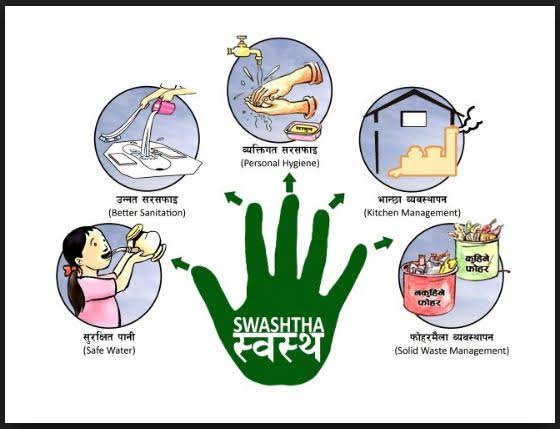.jpg)
The word cleanliness means the state or habit of being clean. To be clean is to be free from dirt or impurities. It is also to be unsoiled or unstained. Cleanliness is a state or habit of avoiding filth. To learn what cleanliness means is different from being clean always. A person can learn all that it means to be clean and yet may be the dirtiest and filthiest of all men. It is not everybody that takes cleanliness seriously, but everybody has to make it his or her first duty to be clean. And cleanliness is not relative to any particular age-group or occupation.
Children, young people and adults must give cleanliness a priority in their lives. In whatever kind of work we do, cleanliness must be reflected as our first and major concern. There are a number of factors that we need to examine about this subject of our discussion now:
* Learning to be clean at home and
* At school
Cleanliness must be learned and must also be taught. The first place to teach it is at home. Parents who are themselves filthy cannot teach their children how to be clean. The parent who will not wash his/her dirty clothes but will keep on using them cannot expect their children clothes clean. In fact such children may conclude in their own thinking that it is fashionable to wear dirty clothes.
The father or mother are a good example for the children. Homes where the bedrooms and the sitting rooms are hardly swept cannot be a good example of what it means to be clean for the children. Parents who do not use the services of their children to sweep the rooms regularly and to clear the cobwebs wherever they are hanging are building filthy homes for themselves and their children.
Parents who depend on their housemaids to do all the cleaning in the house without themselves joining in the cleaning and without bringing their own children into the cleaning activities are not giving their children the right type of lessons that will be of great advantage to them in their later lives. Children must learn to be clean. No parents must expect housemaids to do everything for them what their own children must do for themselves. Parents who depend too much on house-maids to keep the house clean may discover that either the house-maids will not clean the house properly out of frustration, or may learn cleanliness for themselves while the children will only be good spectators of maids that keep the house clean.
The next place to cleanliness besides the home is the school. The desks and most teachers” tables are rarely dusted. Most desks are soiled with ink or oil. Pieces of paper litter most classrooms and the school compounds. Some teachers, no doubt, contribute to the filth of the school. Some teachers eat on the same tables on which they write. It is not cleanliness for students (or teachers) to finish their lunch, wash their hands and clean them with a sheet of the exercise book or rub them on their own heads or legs. Teachers must teach their pupils to be clean in their dresses. This is the reason why most schools require their students to have about three pairs of their school uniforms so that they wear neat uniform to school everyday. But teachers must themselves appear very neat in the dresses they, too, wear to school: for how can students be expected to be clean when their teachers, too are dirty?
Cleanliness, whether at home or at school requires that not only should the hair be kept neat and properly combed, but the teeth also must be cleaned each morning. When we were in primary school in those days, it was the practice for a teacher to go round after the devotional period and examine our uniforms, our hair, our finger nails, and our teeth. Any pupil who was unkempt would not only be lashed with a cane but could be sent home for that day. It was not easy, on reaching home, to tell one”s parents, I was sent home because I am dirty”
What are the effect of uncleanliness?
Uncleanliness has several effects on humans. There are many things uncleanliness can causes but I will mentions few that are most important
-----
* Due to uncleanliness, several pollutions occure and this causes diseases in humans. Especially children suffer from this.
* Also there is a huge growth of mosquitoes.
* Our surrounding areas get polluted. And thus social health is affected.
* Many animals and humans die. It cause several severe diseases. It also increases the amount of germs in our environment. It makes the resources unclean like water etc.
Many people in our society are very careless about what they eat and how it is prepared. Most people who sell food care very little about its cleanliness as well as the cleanliness of the surroundings where the food is prepared. If you take a walk through most of the major cities of this country you will see what I am talking about. The inside of the roadside bar or food canteen where you eat is usually an eyesore. Sometimes the hungry man has to battle with large-sized flies which are also struggling to have a bite from the food. The table on which the food is placed may not be cleared before the next customer. The water you drink and the water with which you wash your hands show no sign of being filtered. The kitchen where the food is prepared is itself full of dirt and cobwebs. Sometimes plates that are not washed are kept there. Quite often the fresh meat that is to be cooked for the customers is exposed for flies to settle on it. The kitchens in most homes, too, are an eyesore. Mothers and their children have a duty to see that their kitchens are kept clean immediately after the meals have been cooked. Mothers must see it to that the plates used for the meals are also washed immediately. It may not be out of place for fathers to lend a helping hand in order to underscore the importance that he attaches to cleanliness in his home.
Cleanliness makes you likeable. Shabbiness bring you disgrace.
Parent's should involve their children in home activities in terms of Cleanliness and not dedicate all home duties to house-made.
Image: credit
Image: credit
Thanks for stopping by on my post
----
.png)
 hiveblocks
hiveblocks